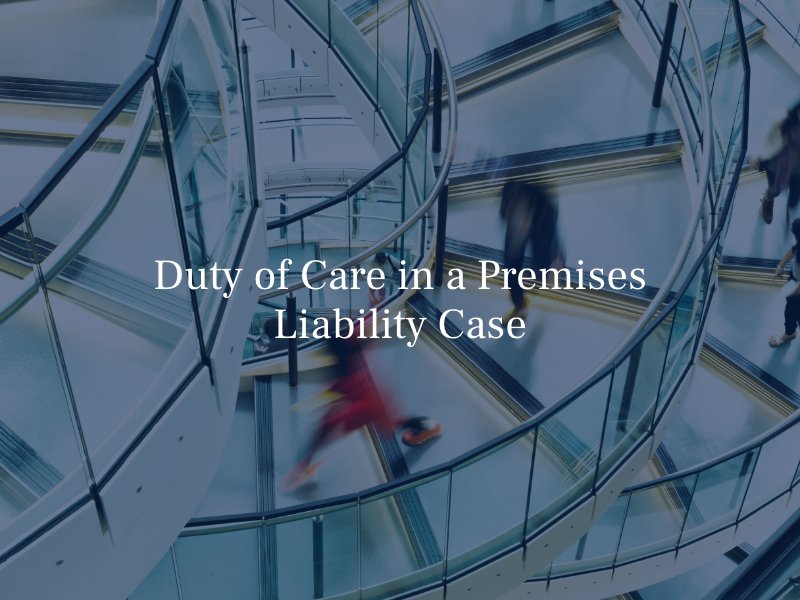What is Duty of Care in a Premises Liability Case?
January 19, 2024 Posted In Premises Liability
In premises liability cases, the concept of “duty of care” is fundamental to establishing the legal responsibilities of property owners or occupiers. Duty of care refers to the obligation to maintain a safe environment for individuals who enter the premises legally. Therefore, if you are injured on another party’s property, the liable party’s duty of care is one element you must prove to recover compensation.

Legal Foundations
Duty of care is a legal principle that forms the basis of premises liability cases. It acknowledges the responsibility property owners have to ensure that their premises are reasonably safe for visitors and lawful occupants.
Visitor Classifications
The duty of care owed by a property owner varies based on the status of the visitor. Visitors are typically categorized into three classes: invitees, licensees, and trespassers. Invitees, those who are invited onto the property for the owner’s benefit, receive the highest level of care. Licensees, those with permission to enter but for their own purposes, also deserve a reasonable level of care. Trespassers, while owed the least duty of care, should not be subjected to intentional harm.
Standard of Care
The standard of care is the level of caution and prudence that a reasonable person would exercise in similar circumstances. Property owners must adhere to this standard, ensuring that their actions align with what a reasonably prudent person would do to maintain a safe environment.
Maintenance and Inspection
Property owners are expected to regularly inspect and maintain their premises to identify and address potential hazards. This includes repairing defects, ensuring proper lighting, and promptly addressing any dangerous conditions.
Warning of Hazards
When hazards cannot be immediately rectified, property owners have a duty to warn visitors of potential dangers. This may involve posting warning signs or restricting access to hazardous areas.
Foreseeability of Harm
The foreseeability of harm is a critical element in duty of care. Property owners are generally expected to anticipate and address foreseeable risks. If a hazard is reasonably foreseeable, and the owner fails to take appropriate action, they may be held liable for resulting injuries.
Breach of Duty of Care
In a premises liability case, a breach of the duty of care occurs when a property owner fails to meet the required standard, leading to unsafe conditions. Failure to uphold the duty of care can have legal ramifications for property owners. If an injured party can demonstrate that the property owner’s negligence caused their injuries, the owner may be liable for resulting damages.
Proving Duty of Care
Proving duty of care in a premises liability case involves demonstrating the following:
Legal Status
Establishing your legal status (e.g., invitee or licensee) on the premises will dictate the level of care the property owner or occupier owed you.
Purpose of Visit
Clearly establish the purpose of your visit to the property. If your presence served a purpose that benefited the property owner (e.g., as a customer or guest), it strengthens the argument for a higher duty of care owed to you.
Common Areas vs. Restricted Areas
Determine whether you were in a common area open to the public or a restricted area. Property owners typically owe a duty of care to individuals in common areas, and they may have a heightened duty if the area is designed for customer use.
Awareness of Your Presence
Establish that the property owner was aware of your presence on the premises. If the owner was aware or should have reasonably been aware of your presence, it reinforces the duty of care owed to you.
Nature of Hazard
Identify the nature of the hazard that led to your injury. If the hazard was foreseeable and could have been anticipated by the property owner, it strengthens the argument for the existence of a duty of care.
Previous Incidents
Investigate whether there were previous incidents or complaints related to similar hazards on the property. If the property owner had prior knowledge or should have known about the potential dangers, it supports the argument for a duty of care.
Building Codes and Regulations
Review relevant building codes and regulations to determine the required duty of care based on the property type and its use. Non-compliance with these standards may indicate a failure to meet the duty of care.
Communications and Warnings
Look for evidence of a lack of communication or warnings provided by the property owner regarding potential hazards.
Consult a Riverside Premises Liability Attorney
Seeking legal advice from an experienced Riverside Premises Liability Lawyer is crucial. They can analyze the specific details of your case, assess the legal standards applicable, and guide you on how to establish that the property owner owed you a duty of care.